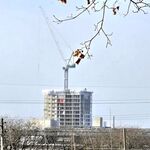Pfloyd
New Member
Reading a lot of these negative comments in regards to Vaughan's proposed 10% family size condo units requirement, I come to the sad realization that most people in Toronto (if in fact those forumers are in Toronto) really are very suburban in that particular North American mindset. Although, many people claim that economics is what drives people to the periphery, I do believe that a large part of it is something embedded in the psyque of many people since the 1950's in this part of the world.
In most major cities around the world (outside NA, of course), families do live in (or very close to) the urban core of the city: London. Paris, Madrid, Tokio, Buenos Aires, etc, etc.
It's all a function of density and proximity to services and public transit, just like European cities. This whole notion that kids must have a private backyard when growing up is very American/North American. I guess although we can claim that Toronto is in the urban major leagues in North America (competition being very minimal: NYC, downtown Chicago, San Francisco), with this kind of mentality family=suburbs/single professionals=downtown, we'll never reach that next level of a truly cosmopolitan urban environment.
In most major cities around the world (outside NA, of course), families do live in (or very close to) the urban core of the city: London. Paris, Madrid, Tokio, Buenos Aires, etc, etc.
It's all a function of density and proximity to services and public transit, just like European cities. This whole notion that kids must have a private backyard when growing up is very American/North American. I guess although we can claim that Toronto is in the urban major leagues in North America (competition being very minimal: NYC, downtown Chicago, San Francisco), with this kind of mentality family=suburbs/single professionals=downtown, we'll never reach that next level of a truly cosmopolitan urban environment.
Last edited:




